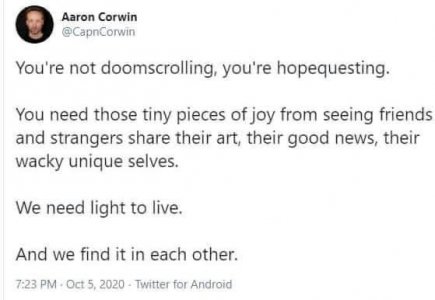Nathan
SF VIP
- Location
- High Desert- Calif.
Doomscrolling or doomsurfing is the act of spending an excessive amount of time reading large quantities of negative news online. In 2019, a study by the National Academy of Sciences found that doomscrolling can be linked to a decline in mental and physical health.
The practice of doomscrolling can be compared to an older phenomenon from the 1970s called the mean world syndrome, described as "the belief that the world is a more dangerous place to live in than it actually is as a result of long-term exposure to violence-related content on television". Studies show that seeing upsetting news leads people to seek out more information on the topic, creating a self-perpetuating cycle.
In common parlance, the word "doom" connotes darkness and evil, referring to one's fate (cf. damnation).In the early online days, "surfing" was a common verb used in reference to browsing the internet; similarly, the word "scrolling" refers to sliding through online text, images, etc.Though the word "doomscrolling" is not found in their dictionary itself, Merriam-Webster is "watching" the term—a designation for words receiving increased use in society that do not yet meet their criteria for inclusion. Dictionary.com chose it as the top monthly trend in August 2020.The Macquarie Dictionary named doomscrolling as the 2020 Committee's Choice Word of the Year.
Popularity
The term gained popularity in the early 2020s through events such as the COVID-19 pandemic, the George Floyd protests, the 2020 U.S. presidential election, the 2021 storming of the U.S. Capitol, and the 2022 Russian invasion of Ukraine, all of which have been noted to have exacerbated the practice of doomscrolling.
Doomscrolling became widespread among Twitter users during the COVID-19 pandemic, and has also been discussed in relation to the climate crisis
The practice of doomscrolling can be compared to an older phenomenon from the 1970s called the mean world syndrome, described as "the belief that the world is a more dangerous place to live in than it actually is as a result of long-term exposure to violence-related content on television". Studies show that seeing upsetting news leads people to seek out more information on the topic, creating a self-perpetuating cycle.
In common parlance, the word "doom" connotes darkness and evil, referring to one's fate (cf. damnation).In the early online days, "surfing" was a common verb used in reference to browsing the internet; similarly, the word "scrolling" refers to sliding through online text, images, etc.Though the word "doomscrolling" is not found in their dictionary itself, Merriam-Webster is "watching" the term—a designation for words receiving increased use in society that do not yet meet their criteria for inclusion. Dictionary.com chose it as the top monthly trend in August 2020.The Macquarie Dictionary named doomscrolling as the 2020 Committee's Choice Word of the Year.
Popularity
The term gained popularity in the early 2020s through events such as the COVID-19 pandemic, the George Floyd protests, the 2020 U.S. presidential election, the 2021 storming of the U.S. Capitol, and the 2022 Russian invasion of Ukraine, all of which have been noted to have exacerbated the practice of doomscrolling.
Doomscrolling became widespread among Twitter users during the COVID-19 pandemic, and has also been discussed in relation to the climate crisis


